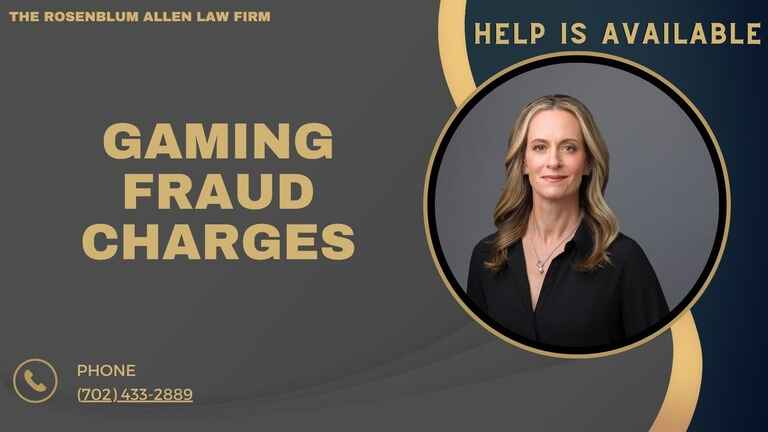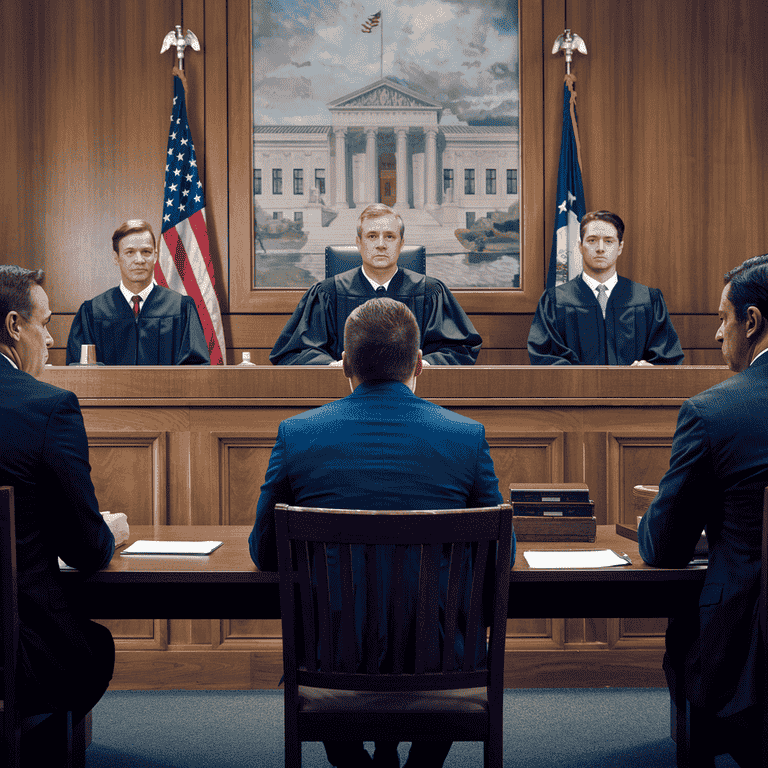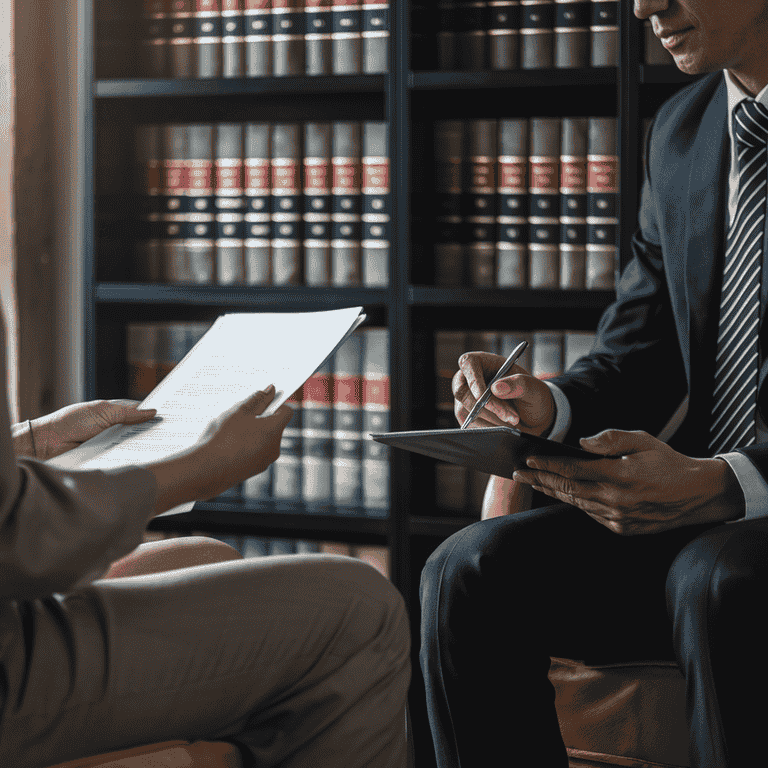What is Gaming Fraud?
Gaming fraud refers to dishonest or illegal practices used to deceive casinos, gaming operators, or others involved in gambling. These actions are intended to gain an unfair advantage or to cheat the system for personal gain. In Nevada, where gambling is a major industry, gaming fraud charges are taken very seriously. The state has strict laws to ensure fair play and maintain the integrity of its gaming operations.

 Definition of Gaming Fraud
Definition of Gaming Fraud
At its core, gaming fraud involves any attempt to manipulate the outcome of a gambling game, use deceptive tactics, or provide false information to cheat the gaming system. This can include actions such as using counterfeit chips, rigging slot machines, or participating in scams that mislead casino employees or other players.
Common Types of Gaming Fraud in Nevada
Gaming fraud can take many forms, each with varying levels of complexity and impact. Here are some common examples:
Casino Fraud
This type of fraud involves cheating at a brick-and-mortar casino. It could include using marked cards, colluding with dealers, or engaging in other deceitful activities to win unfairly.
Online Gaming Fraud
With the rise of online gambling, fraud has also moved into the digital space. This can include manipulating software or using bots to gain an unfair advantage during online casino games or poker games.
Slot Machine Manipulation
In some cases, individuals might try to tamper with physical slot machines, altering the machine’s settings or using devices that manipulate how the machine operates, in order to increase their chances of winning.
Cheating at Table Games
Table games, such as blackjack, poker, or roulette, are often targets for fraudulent activity. This can include card counting, chip dumping, or colluding with other players to rig the game’s outcome.
Differences Between Gaming Fraud and Other Types of Fraud
While gaming fraud is a form of fraud, it has some distinct characteristics. Other common types of fraud, such as credit card fraud, identity theft, or insurance fraud, typically involve different methods and targets. Here’s how gaming fraud differs:
- Target: Gaming fraud specifically targets gambling establishments, players, and the gaming process itself.
- Methods: The methods used in gaming fraud are usually related to altering or cheating within the game (e.g., rigging equipment or collusion), unlike other fraud types that may involve deception for financial gain in unrelated fields.
- Laws: Gaming fraud is governed by specialized gaming laws in Nevada, which have stricter penalties than other forms of fraud due to the nature of the industry.

Legal Consequences of Gaming Fraud Charges
Gaming fraud charges carry serious legal consequences. If convicted, you may face both criminal and civil penalties, which could have a lasting impact on your life.
Penalties for Gaming Fraud in Nevada
Nevada has strict laws governing gambling activities, and gaming fraud is no exception. The penalties for gaming fraud can be severe, depending on the type and severity of the offense.
Fines
The fines for gaming fraud vary, but they can be substantial. In some cases, fines can reach tens of thousands of dollars.
Prison Sentences
If convicted of gaming fraud, a defendant could face a significant prison sentence. Depending on the severity of the charge, a conviction could result in anywhere from a few years to several decades in prison.
Probation
In some cases, rather than serving time in prison, a defendant may be placed on probation. During probation, the individual must comply with certain conditions, such as regular check-ins with a probation officer or completing community service. Violating probation can result in further legal consequences.
Impact of a Gaming Fraud Conviction
Being convicted of gaming fraud can have long-lasting effects on your personal and professional life. The consequences of a conviction extend far beyond the immediate legal penalties.
Criminal Record
A gaming fraud conviction will appear on your criminal record, which can impact your ability to secure employment, rent an apartment, or obtain loans in the future.
Loss of Employment Opportunities
Many jobs, particularly in the legal and financial sectors, require background checks. A gaming fraud conviction may disqualify you from certain career paths.
Damage to Reputation
A conviction for gaming fraud can severely damage your personal and professional reputation. People may question your integrity, and it can lead to strained relationships with family, friends, and colleagues.
Defenses Against Gaming Fraud Charges
If you’re facing gaming fraud charges, it’s important to understand the defenses available to you. With the right legal strategy, it’s possible to challenge the evidence or the intent behind the charge. Here are some of the most common defenses against gaming fraud charges:
Lack of Intent to Defraud
Gaming fraud often requires proof that the person had the intent to cheat or deceive. If you can show that you did not intend to defraud the casino or gaming establishment, the charge could be dismissed or reduced. For example, if you made an honest mistake or didn’t understand the rules, it may be enough to argue that you didn’t have the necessary criminal intent.
Mistaken Identity or False Accusations
In some cases, people are wrongly accused of gaming fraud. Casinos or other players might misidentify someone who had no involvement in any fraudulent activity. If you can prove that the accusation is false or that you were not the person who committed the fraud, it could lead to the charges being dropped.
Invalid Evidence or Lack of Proof
A successful defense against gaming fraud might include questioning the evidence presented against you. This could involve demonstrating that surveillance footage is unclear or that the evidence used to charge you is unreliable. If the prosecution can’t provide sufficient proof that you committed gaming fraud, you may be acquitted.
Duress or Coercion
If you were forced or threatened into committing the fraud, you may be able to use duress as a defense. Duress means that you were under pressure or in fear for your safety, which led you to commit the illegal act. If your defense can prove that you acted under duress, it may lead to a more lenient outcome.
Entrapment
Entrapment occurs when law enforcement or casino personnel set up a situation to make you commit a crime that you otherwise would not have done. If you can demonstrate that the authorities encouraged or forced you into committing gaming fraud, you may have an entrapment defense.

How Gaming Fraud Investigations Work
When law enforcement or gaming authorities suspect gaming fraud, an investigation begins. Understanding how these investigations work can help you navigate the legal process.
Who Investigates Gaming Fraud Cases?
In Nevada, several authorities are responsible for investigating gaming fraud. These include:
Nevada Gaming Control Board
The Nevada Gaming Control Board (NGCB) is a key authority in regulating and investigating gambling activities. They have the power to investigate allegations of gaming fraud and work closely with other law enforcement agencies to catch violators.
Local Law Enforcement
In addition to the NGCB, local police departments and other law enforcement agencies may be involved in investigating gaming fraud. If the case involves criminal activity that extends beyond the gaming establishment, local authorities may be called in to assist.
How Authorities Gather Evidence
When investigating gaming fraud, authorities use several methods to gather evidence:
Surveillance Footage
Most casinos have extensive surveillance systems, often referred to as “the eye in the sky.” This footage can be reviewed to determine if any cheating or fraudulent behavior occurred.
Witness Testimonies
Witnesses, including casino employees, other gamblers, or security personnel, can play a significant role in gathering evidence for a gaming fraud case. Their testimonies may be used to support or contradict the claims made by the accused.
Forensic Analysis of Gambling Devices
In some cases, experts may examine gaming devices like slot machines or card shuffling equipment for signs of tampering. A forensic analysis may reveal if the device was altered or manipulated in any way to facilitate cheating.
How an Experienced Attorney Can Help with Gaming Fraud Charges
Facing gaming fraud charges can be overwhelming, but having an experienced attorney on your side can make a significant difference. An attorney can guide you through every step of the legal process and work to protect your rights.
Legal Representation in Court
A skilled attorney will represent you in court, ensuring that your case is presented clearly and effectively. They’ll argue on your behalf, challenging the prosecution’s case and working to achieve the best possible outcome.
Negotiating Plea Deals
In some cases, it may be possible to negotiate a plea deal, where you agree to a reduced charge or sentence in exchange for a guilty plea. An experienced attorney can help negotiate a plea deal that minimizes the consequences you face.
Challenging the Evidence Against You
Your attorney will carefully examine the evidence presented against you. They may challenge the reliability or validity of the evidence, including questioning surveillance footage, witness testimonies, or forensic analyses.
Developing a Strong Defense Strategy
A criminal defense attorney will work with you to develop a strong defense strategy. They’ll assess your case and advise you on the best course of action based on the facts and the available evidence.

Steps to Take if You Are Facing Gaming Fraud Charges
If you’ve been charged with gaming fraud, taking the right steps early on can help protect your rights and improve your chances of a favorable outcome. Here’s what you should do:
Contact a Criminal Defense Attorney
The first thing you should do is reach out to a qualified criminal defense attorney. They’ll provide you with legal advice, explain your options, and represent you throughout the legal process.
Understand Your Legal Rights
It’s essential to know your rights when facing any criminal charge. Your attorney will explain your rights to you, including your right to remain silent, your right to an attorney, and your right to a fair trial.
Prepare for the Legal Process
Prepare yourself for the legal process by understanding the steps involved, including:
Preliminary Hearing
A preliminary hearing will take place where the judge will determine whether there’s enough evidence to move forward with the case. This is an important step, as your attorney can argue for the charges to be dismissed if the evidence is insufficient.
Discovery Process
During discovery, both sides exchange evidence and information. This allows your attorney to review the case thoroughly and assess how to challenge the prosecution’s evidence.
Trial
If your case goes to trial, your attorney will represent you in court, present evidence, cross-examine witnesses, and fight for your acquittal.

Breaking It Down for You
Facing gaming fraud charges can be overwhelming, but understanding the legal process and knowing your options can help you navigate this challenging situation. Whether it’s defending against accusations, understanding how investigations work, or working with a skilled attorney, being informed is vital to achieving the best possible outcome.
By familiarizing yourself with common defenses against gaming fraud, how evidence is gathered, and how an attorney can protect your rights, you’ll be better prepared to handle any legal challenges that come your way. If you’re dealing with gaming fraud charges, securing professional legal assistance early can make a significant difference in the outcome of your case.
Remember, your defense begins with the right legal support. Don’t hesitate to reach out to a qualified attorney to guide you through the process and make sure your rights are upheld at every stage.

Frequently Asked Questions
What types of evidence can be used to support a gaming fraud charge?
Evidence in gaming fraud cases may include surveillance footage, digital records, eyewitness testimony, and forensic analysis of gaming machines or systems. Any documentation that shows fraudulent activity, such as betting patterns or irregularities in game outcomes, can also be used.
What are the penalties for gaming fraud in Las Vegas?
Penalties for gaming fraud in Las Vegas can vary depending on the severity of the offense. Convictions can result in fines, restitution, and prison sentences. In some cases, individuals may face both criminal charges and civil penalties. The length of a sentence or the amount of the fine often depends on the amount of money involved and the scale of the fraudulent activities.
Can I face gaming fraud charges even if I didn’t directly commit the fraud?
Yes, you could face charges if you knowingly participated in or benefited from fraudulent activity, even if you didn’t directly commit the fraud. For example, if you used cheating devices or participated in a scheme without reporting it, you could be held accountable under the law.
Is it possible to have gaming fraud charges dismissed?
It is possible to have gaming fraud charges dismissed if the evidence against you is insufficient or if there was a violation of your rights during the investigation. A skilled attorney can help challenge the evidence or the way it was obtained, which could lead to a dismissal of the charges.
What should I do if I’m arrested for gaming fraud?
If you’re arrested for gaming fraud, it’s important to remain calm and exercise your right to remain silent. Contact an attorney immediately. Do not provide a statement or admit to anything without legal counsel present, as this could be used against you later.
Can a gaming fraud conviction be appealed?
Yes, if you are convicted of gaming fraud, you have the right to appeal the decision. An appeal is typically based on errors that occurred during the trial or new evidence that could impact the case. An experienced attorney can guide you through the appeals process.
How long do gaming fraud investigations usually take?
The length of a gaming fraud investigation can vary widely depending on the complexity of the case and the amount of evidence involved. Simple cases may be resolved within a few months, while more complicated cases involving large sums of money or organized schemes may take longer.
What role does an attorney play in defending against gaming fraud charges?
An attorney plays a crucial role in reviewing the evidence, building a defense strategy, negotiating with prosecutors, and representing you in court. They can help identify weaknesses in the prosecution’s case, develop legal arguments for your defense, and work to minimize the penalties you face.
Can gaming fraud charges affect my career or reputation?
Yes, being charged with gaming fraud can harm your professional reputation and career. Convictions, even if they don’t lead to a prison sentence, can have long-term consequences, especially in industries related to gambling or finance. Legal representation can help mitigate these potential consequences.
What are common defenses against gaming fraud charges?
Some common defenses against gaming fraud charges include challenging the validity of the evidence, proving a lack of intent to commit fraud, or showing that the defendant was unaware of the fraudulent activities. An experienced attorney can determine the best defense strategy based on the specific details of the case.

Glossary
Gaming Fraud: The act of using deceit or illegal practices to manipulate the outcomes of gambling games, betting systems, or gaming equipment for personal gain.
Defense Strategy: A plan or approach developed by a defense attorney to challenge the prosecution’s case, protect the defendant’s rights, and minimize potential penalties.
Surveillance Footage: Video recordings used as evidence in criminal cases, often obtained from security cameras, that may show an individual’s actions during a particular event or crime.
Eyewitness Testimony: The account or statement of an individual who directly observed the crime or event in question, used as evidence in legal proceedings.
Forensic Analysis: The application of scientific methods and techniques to investigate and evaluate evidence in criminal cases, including analysis of digital records, gaming equipment, or physical evidence.
Restitution: The act of compensating a victim for losses or damages caused by a crime, often ordered by the court as part of a conviction.
Civil Penalties: Financial fines or other consequences imposed by a court or regulatory body, typically separate from criminal penalties, as a result of violating laws or regulations.
Fraudulent Activity: Any act or scheme intended to deceive others for financial gain, typically involving manipulation of facts, documents, or systems.
Cheating Devices: Tools or mechanisms used to alter the outcome of gambling games or gaming machines, often illegal and a common element in gaming fraud cases.
Dismissal of Charges: The legal decision to drop or reject charges against a defendant, often due to insufficient evidence, legal errors, or procedural issues in the case.
Appeal: A legal process in which a higher court reviews the decision made by a lower court, typically due to errors in the trial process or new evidence.
Restitution: Compensation paid to victims to cover financial losses caused by the defendant’s fraudulent or criminal activities.
Intention: The mental state or purpose behind an individual’s actions, which may be a crucial factor in determining whether a crime was committed deliberately.
Prosecutor: A legal official responsible for presenting the case against a defendant in a criminal trial, aiming to prove the defendant’s guilt.
Negotiation: The process by which attorneys or parties involved in a case discuss terms, often leading to a settlement or plea deal before trial.
Appeals Process: The procedure by which a party challenges a court’s decision in a higher court, typically involving legal arguments or new evidence to overturn a conviction.
Conviction: A legal judgment in which a defendant is found guilty of the charges against them following a trial or plea agreement.
Criminal Case: A legal proceeding in which the state prosecutes an individual or entity for violating criminal law, typically involving penalties like fines, imprisonment, or probation.
Legal Counsel: An attorney or lawyer who provides legal advice, representation, and assistance to a client in legal matters.
Prosecution: The legal team representing the government in criminal cases, responsible for proving the defendant’s guilt beyond a reasonable doubt.
Witness: An individual who provides testimony in court, either as an eyewitness, expert, or character witness, to help establish facts in a case.
Burden of Proof: The obligation of the prosecution to provide sufficient evidence to prove the defendant’s guilt beyond a reasonable doubt in a criminal case.
Defense Attorney: A lawyer who represents a defendant in a legal case, aiming to defend their rights and present arguments that could result in a reduced sentence or dismissal of charges.
Plea Deal: A negotiated agreement in which the defendant agrees to plead guilty to a lesser charge or accept a reduced sentence in exchange for cooperation with the prosecution.
Fraudulent Scheme: A coordinated set of actions or plans designed to deceive others for financial gain, often involving multiple individuals or tactics.
Gaming Systems: The underlying technology and processes that control gaming machines, games, or online gambling platforms, including software and hardware components that can be manipulated for fraudulent purposes.

Additional Resources for You
Molly Rosenblum, Esq., our lead attorney, has crafted an extensive selection of resources specifically designed to assist individuals facing legal issues related to gaming and gambling. These resources, available on the Rosenblum Law website, provide crucial insights, legal guidance, and support for a variety of situations related to gaming laws and regulations. Whether you are dealing with underage gambling, gambling debt, or other gaming-related violations, these resources offer valuable information to help navigate the complexities of the law. Here’s a brief overview of the resources created to aid you:
-
Underage Gambling: Detailed information and legal advice for cases involving underage individuals participating in gambling activities. Explore underage gambling laws.
-
Gambling Debt Collection Crimes: Guidance on the legal implications of collecting gambling debts and the crimes associated with such activities. Understand gambling debt collection crimes.
-
Gambling Violations: A comprehensive overview of various gambling violations and the potential legal consequences of such actions. Learn about gambling violations.
-
Marked Cards: Legal advice for cases involving the use of marked cards, a common form of cheating in card games. Discover the implications of using marked cards.
-
Pinching Bets: Information on the illegal practice of pinching bets, including the legal risks and penalties involved. Explore the consequences of pinching bets.
-
Past Posting: Insights into past posting, a form of cheating in gambling where bets are placed after the outcome is known. Understand past posting and its legal repercussions.
-
Unlawful Acts Regarding Gaming Equipment: Detailed legal information on the unlawful use or manipulation of gaming equipment. Learn about the legality of gaming equipment use.
-
Sports Betting Fraud: Guidance on the legal aspects of sports betting fraud, including common schemes and penalties. Explore sports betting fraud.
Through these resources, Molly Rosenblum, Esq., aims to provide support and legal experience to individuals navigating the legal challenges associated with gambling and gaming. We encourage you to utilize these resources, ensuring you are well-informed and prepared to address any legal issues you may encounter in this area.

Offsite Resources for You
Here are some additional resources that you might find useful in increasing your understanding of legal issues related to felonies, criminal defense, and the justice system in Nevada:
Office of Juvenile Justice and Delinquency Prevention: This is a comprehensive resource from the U.S. Department of Justice that provides a wealth of information on juvenile justice issues.
National Juvenile Defender Center: This organization offers resources and advocacy for juvenile defense attorneys and the young people they represent.
American Civil Liberties Union (ACLU) – Juvenile Justice: The ACLU provides resources and information on civil rights issues related to juvenile justice.
The Annie E. Casey Foundation – Juvenile Justice: This foundation provides data, policy recommendations, and toolkits related to juvenile justice reform.
National Center for Juvenile Justice: This organization is a major source of statistical information and research on juvenile justice issues in the United States.
Please note that while these resources can provide valuable information, they are not a substitute for legal advice. Always consult with a qualified attorney for advice related to your specific situation.

A Special Message from Our Lead Attorney

Molly Rosenblum
Dear Reader,
Thank you so much for taking the time to read through our resources on gaming fraud. We understand that dealing with such issues can be complex and stressful. It’s our mission to provide you with the information you need to navigate these challenging situations.
I’m Molly Rosenblum, Esq, and I’d like to invite you. If you or a loved one is facing a gaming fraud charge or have more questions, don’t hesitate to get in touch with us. We offer a free consultation to discuss your case, answer your questions, and explore your best options.
You can schedule this free consultation by calling us at (702) 433-2889. Our knowledgeable team is ready to assist and provide the support you need.
Remember, you don’t have to navigate this alone. We’re here to help.
Best,
Molly Rosenblum, Esq.



